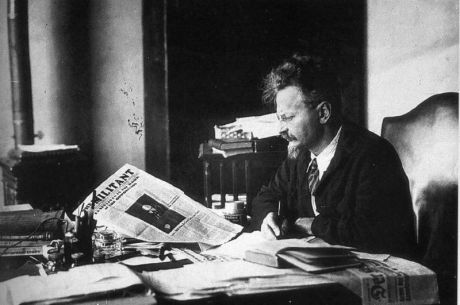Arts
You are here
Trotsky knew how to party

September 5, 2014
Review of Leon Trotsky and the Organizational Principles of the Revolutionary Party, by Dianne Feeley, Paul Le Blanc, and Thomas Twiss, Haymarket Books, 2014
Objectively capitalism is ripe for overthrow and we live in a period of mass movements--Occupy, the Arab Spring, Palestine Solidarity, climate justice movements. Yet there is an absence of activists who can connect these things to each other, to the system that is the problem, and to an alternative. We need to build organizations that are effective and united, but also diverse in the opinions the members hold. Choosing an effective course of action and uniting behind it requires lively democracy and a talented leadership.
Trotsky vs Stalin
This book is a fascinating account of many of Leon Trotsky's writings on democracy in a revolutionary party. Trotsky was a leading member of the Bolshevik party during the Rusian revolution in 1917. He never capitulated to the Stalinist counter-revolution that destroyed the party and the new workers' state. Trotsky led the Left Opposition which tried to win the Communist parties in Russia and elsewhere back to revolutionary politics.
After being expelled from the party and the country in the late 1920's, it was clear that that fight was lost and he devoted the rest of his life to helping to build revolutionary organizations around the world. His experience in the only worker's party to ever lead a successful revolution, his attempts to save that party, and the numerous small organizations he advised, leaves us with a wealth of writings on the question of how revolutionary organizations of all sizes can build a flourishing internal democracy.
The first two chapters deal with the party democracy as it was practised in the Bolshevik Party. The first chapter has some general comments on how the Party organized itself and conducted debate. In the second chapter this history is used a criticism of the absence of democracy in the Stalinized party. In contrast to a party of obedience to an uncountable leadership, Trotsky describes a member of the Bolsheviks as someone, “who in each case and on each question forges a firm opinion of his own and defends it courageously and independently, not only against his enemies, but inside his own party.” (Please excuse the gendered language.)
This internal discussion is required to build an organization that can provide a lead at key moments: “The level of a revolutionary organization rises all the faster, the more immediately it is brought into the discussion of all questions, the less the leaders try to think, act and behave as guardians for the organization.”
The dialectic of democratic centralism
The third chapter deals with Trotsky's correspondence with the leadership of many small organizations that were building a revolutionary alternative both to reformist social democracy and its evil twin the Stalinist communist parties. Much more of his writings in this period deal with the creation and role of a leadership within a revolutionary party.
The thing I found the most striking was how conciliatory he advised the leaders of small organizations to be. The Trotsky trying to organize uncompromising and implacable opposition amongst party members to Stalinist control gives way to the Trotsky of gentle persuasion, trying to help inexperienced revolutionaries keep together parties containing a heterogeneous membership that were frequently on the edge of splits.
He describes the flexibility of methods required: “The formula for democratic centralism must inevitably find a different expression in the parties of different countries and in different stages of development of one and the same party.” In this period he is very demanding on both the leadership and the members of small organizations. He writes, “the maturity of each member of the party expresses itself particularly in the fact that he does not demand from the party regime more than it can give.” At the same time he gives the similar advice to the leadership of the newly formed Socialist Workers Party in the United States. Trotsky argues with the leadership that simply having a formal majority is not enough to keep a small organization together. The leadership must give the minority every chance to make their arguments heard, and he suggests that some of the minority members be included on the executive committee.
He explains that authority in a revolutionary party doesn't come from formal elections but is earned over years of practice. “Since it is not only the leaders who educate the party but also the party that educates the leaders. Herein lies the salutary dialectic of democratic centralism.”
Building a vibrant, welcoming, and flexible revolutionary organization is one of the hardest things anyone can do. There is much we can learn from the generations that have gone before us and tried to build such an organization. This book is an important contribution to that study.
If you like this article, join the International Socialists. If you are in Toronto, join the discussion "A rebel's guide to Trotsky", Saturday September 27, 2pm at Trinity St Paul (427 Bloor St West, Toronto).
Section:









